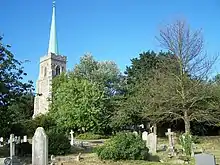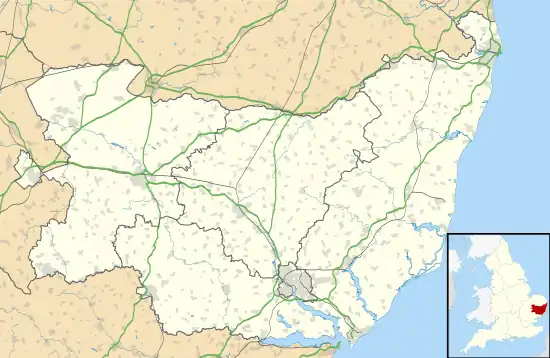St Margaret's Church, Lowestoft
Saint Margaret's Church is the parish church of Lowestoft in the English county of Suffolk. It is dedicated to St Margaret of Antioch[1] and is notable for its large illuminated blue spire which can be seen across the town. The church is located on a hilltop on the north-western edge of the town centre and was used as a navigation landmark.[2]
| St. Margaret's Church | |
|---|---|
 St Margaret's Church, Lowestoft (July 2008) | |
 St. Margaret's Church Location in Suffolk | |
| 52.4864°N 1.7420°E | |
| Location | Lowestoft, Suffolk |
| Country | England |
| Denomination | Anglican |
| Website | www |
| Architecture | |
| Functional status | Active |
| Heritage designation | Grade I listed building |
| Designated | 13 December 1949 |
| Administration | |
| Province | Canterbury |
| Diocese | Norwich |
| Archdeaconry | Norfolk |
| Deanery | Lothingland |
| Parish | Lowestoft St Margaret[1] |
| Clergy | |
| Rector | Revd. Canon Simon Stokes |
| Assistant priest(s) | Revd. Geoff Wilson |
| Laity | |
| Reader(s) | Miss Gerda Buckley |
| Organist(s) | Jonathan Williams |
| Churchwarden(s) | Pam Shaw, Roy Stebbings |
The church is within the deanery of Lothingland and archdeaconry of Norfolk. It falls within the Diocese of Norwich which extends into north Suffolk.[1]
History
The church is medieval and a Grade I listed building with an early 14th-century tower.[3][4] It was founded by the Priory of St. Bartholomew in London which was granted the manor of Lowestoft in 1230 by Henry I.[5] The church contains a wooden panel listing the parish priests since 1308.[4]
The church is built of flint and was substantially enlarged during the 15th century, with the aisles and nave dating from this period.[3] It was refurbished during the Victorian period and the needle spire rebuilt in 1954, replacing the previous wooden spire which dated from 1483.[3][6] It contains the only known glasswork produced by Regency artist Robert Allen, installed in 1819.[2] The east window glass dates from 1891[3] and the church also contains glasswork from St Peter's church, a daughter church of St Margaret's which was demolished in 1975.[2][4]
Incumbents
Vicars
- 1308 John Ayshle
- 1330 Richard De Walcote
- 1331 John De Garboldesham
- 1339 Matthew De Rollesby
- 1347 John Everard
- 1360 John De Welberham
- 1365 William Homfrey
- 1383 ………..Apostolicus
- 1385 William Smogget
- 1432 William Sekynton
- 1442 John Mildewell
- 1456 Thomas Shirecroft
- 1456 John Manyngham
- 1458 Idem
- 1478 Thomas Epis Dromorensis
- 1490 Robert Tomsen
- 1507 John Wheteacre
- 1508 Edward Lee
- 1510 John Bayly
- 1511 John Brown
- 1540 John Blomevyle
- 1555 Thomas Downing
- 1561 William Naysh
- 1574 William Bently
- 1603 John Gleson
- 1610 Robert Hawys
- …… Francis Presse
- 1639 James Rowse
- 1664 Henry Yowell
- 1660 John Youell
- 1677 Jos.Hudson
- 1691 Edward Carleton
- 1698 William Whiston
- 1702 James Smith
- 1708 John Tanner
- 1760 John Arrow
- 1789 Robert Potter
- 1804 Richard Lockwood
- 1830 Francis Cunningham
- RECTORS
- 1860 Charles Hebert
- 1870 William Hay Chapman
- 1873 George Edward Tate
- 1880 Thomas Augustus Nash
- 1889 Charles D'Aguilar Lawrence
- 1901 Albert Darrell Tupper-Carey
- 1910 Edward Lowry Henderson
- 1917 Evan C. Morgan
- 1931 Hawtrey J. Enraght[7]
- 1938 Ralph Layard Whytehead
- 1949 Henry Herbert Redvers Barton
- 1957 William John Westwood
- 1965 Kenneth Wilkinson Riddle (who had been Curate, 1943-47)[8]
- 1969 Douglas Caiger
- 1979 Alan Glendining
- 1985 Paul Allton
- 1994 Martin Clifford Gray
- 1999 John Simpson
- 2011 Michael Asquith
- 2023 Simon Stokes
Organists
- 1790 - 1854 Robert Browne Snr.
- 1854 - 1871 Robert Browne Jnr. (Assistant organist 1871 - 1885 and organist of St. Peter's Church, Lowestoft).
- 1871 - 1885 Frederick Alexander Mann.
- 1885 - 1902 Harry Denton Flowers.
- 1902 - 1935 Ernest Banks.
- 1935 - 1969 Cyril John Mitchell.
- 1969 - 1977 John Alexander Farmer.
- 1977 - 1987 Michael Davies.
- 1988 - 1996 Robert McNeil-Watson.
- 1996 - 2010 Steven Alan Kirk.
- 2011 - 2019 David Bunkell.
- 2019 - Jonathan Stanton Williams
Interior
Within the church the octagonal font dates from the 15th century.[3] The brass lectern is a rare pre-Reformation lectern dating from around 1500.[4] It also contains one of only two remaining banner stave lockers, a feature which is believed to be unique to this area of Suffolk.[2][4]
There are a number of memorials within the church. The north wall of the church contains a memorial to fishermen who lost their lives at sea between 1896 and 1923. After this date the memorial was moved to The Lowestoft Fisherman's and Sailor's Bethel.[4] A war memorial chapel contains a wooden wall inscribed with the names of 711 Lowestoft men who died in the First World War.[4]
Churchyard
The churchyard contains war graves of two service personnel of World War I, and seventeen of World War II.[9]
References
- Lowestoft St Margaret, The Church of England. Retrieved 2012-10-29.
- Lowestoft St Margaret's, Suffolk Churches website. Retrieved 2012-10-30.
- Church of St Margaret, Waveney, British Listed Buildings. Retrieved 2012-10-30.
- Church history, St Margaret's Lowestoft. Retrieved 2012-10-30.
- Page.A (1844) 'Lowestoft Parish', Topographical and genealogical, The County of Suffolk (available online). Retrieved 2012-10-30.
- Lewis.S (ed) (1848) 'Lowestoft (St Margaret)', A Topographical Dictionary of England, pp. 179-181 (available online). Retrieved 2012-10-30.
- Hawtrey Enraght was the son of Fr Richard Enraght, who was persecuted for Ritualism in the 'Bordesely wafer case'.
- Crockford's Clerical Directory, 1973-74, 85th Edition, p 810.
- CWGC Cemetery Report. Breakdown obtained from casualty record.